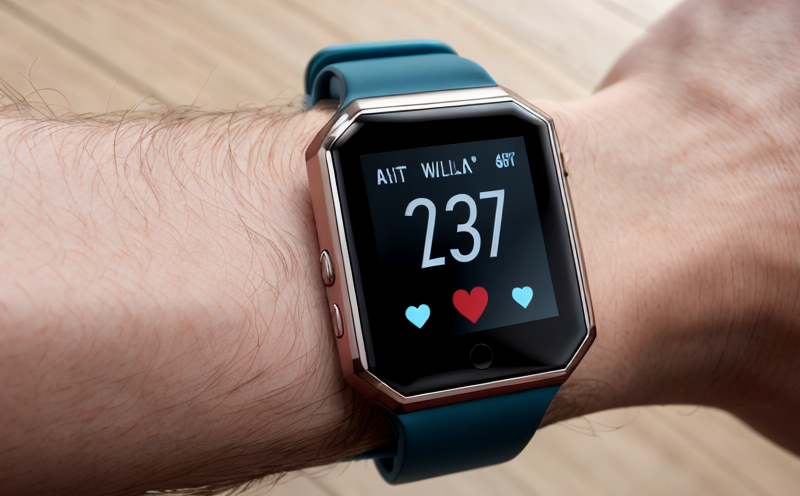UL 2900-1 Cybersecurity Testing for Network-Enabled Wearables
The demand for connected and network-enabled wearables has seen a significant increase in recent years, driven by advancements in technology and the desire for healthcare providers to offer more personalized care. However, with this growth comes an increased risk of cybersecurity threats. UL 2900-1 is a standard designed specifically to address these concerns by providing robust guidelines for cybersecurity testing.
UL 2900-1 aims to ensure that network-enabled wearables are protected against unauthorized access and data breaches, ensuring patient privacy and device integrity. This standard applies not only to the devices themselves but also to the software components responsible for communication between the wearable and other networks or systems. The testing process outlined in UL 2900-1 ensures that manufacturers can demonstrate compliance with industry best practices.
The testing procedures involve simulating various attack vectors, such as malware injection, man-in-the-middle attacks, and denial-of-service (DoS) assaults. These tests help identify vulnerabilities within the device’s security architecture and ensure that appropriate countermeasures are implemented before release to market. Additionally, UL 2900-1 requires comprehensive documentation of all testing activities conducted during development stages.
Manufacturers who comply with UL 2900-1 benefit from enhanced reputation among consumers concerned about their personal information security as well as potential liability protection should a breach occur after launch. It also opens doors to international markets where stringent regulatory requirements exist regarding medical devices and health data.
In summary, adhering to the UL 2900-1 standard demonstrates commitment towards safeguarding user privacy while maintaining operational reliability of connected wearables. By implementing this certification process early in product development cycles, companies can minimize risks associated with cyber threats and build trust among end users.
Industry Applications
The healthcare industry places a high premium on patient safety and privacy. UL 2900-1 provides assurance that connected wearables meet stringent cybersecurity standards, which is crucial for maintaining trust between patients and providers. This standard applies particularly well to wrist-worn devices such as smartwatches equipped with heart rate monitors or sleep trackers.
Smart glasses used in professional settings like construction sites can also benefit from UL 2900-1 certification, ensuring that sensitive data transmitted over wireless networks remains secure. Additionally, fitness bands designed for elderly individuals might incorporate fall detection features relying heavily on real-time data transfer capabilities—making them prime candidates for this certification.
For manufacturers developing IoT-enabled medical devices like insulin pumps or home dialysis machines, adhering to UL 2900-1 ensures compliance with global regulations while enhancing brand reputation among consumers who value robust security measures. Compliance helps streamline the approval process across different countries and regions, reducing time-to-market for innovative healthcare solutions.
Environmental and Sustainability Contributions
UL 2900-1 contributes positively to environmental sustainability by promoting responsible design practices that minimize energy consumption during operation. The standard encourages manufacturers to optimize power management strategies within their products, thereby reducing overall carbon footprints associated with manufacturing processes.
Furthermore, adhering to UL 2900-1 fosters sustainable business practices by encouraging continuous improvement in product security and resilience against evolving cyber threats. This proactive approach helps reduce waste from recalled or non-compliant devices that could otherwise contribute to landfill pollution if not properly recycled.
The certification also supports the circular economy model by promoting longer product lifecycles through enhanced durability and reduced vulnerabilities, leading to fewer replacements and repairs over time. Ultimately, UL 2900-1 aligns with broader sustainability goals within the medical device sector while enhancing overall patient care quality.
Use Cases and Application Examples
Incorporating remote monitoring capabilities into home healthcare devices allows doctors to track patients' vital signs continuously without requiring frequent visits, improving both treatment efficacy and patient convenience.
Smart eyewear designed for workers in hazardous environments can transmit real-time location data securely back to central hubs, enhancing workplace safety protocols while protecting personal information from unauthorized access.
Integration of mobile apps with wearable fitness trackers enables users to set personalized goals and receive tailored exercise recommendations based on individual health metrics collected through the device.
IoT-enabled insulin pumps equipped with UL 2900-1 certification ensure secure data exchange between the pump and connected healthcare platforms, minimizing risks of medication delivery errors due to cyberattacks or system failures.





